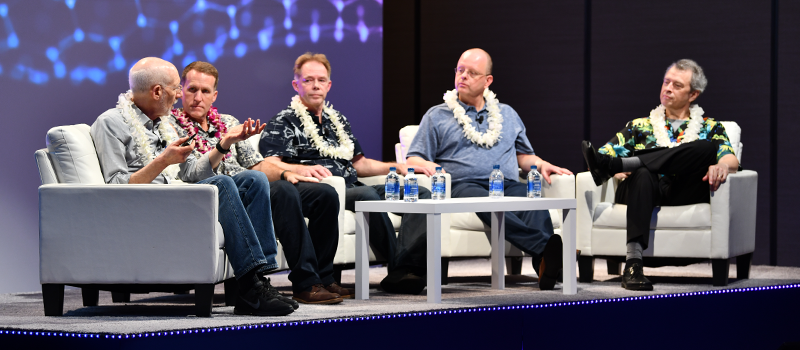 Panelists explore four key reports to get a big picture of the industry’s transformation.
Panelists explore four key reports to get a big picture of the industry’s transformation.Much of what is accomplished in telecommunications focuses on the technical, the nuts and bolts of how we’re addressing problems or creating services. It can be easy to lose sight of the bigger picture and some of the broader impacts of what we do. The interconnections we create can impact societies, move markets, and open the doors to new possibilities.
The PTC’19 “Data to the Masses! An Exploration of Networks and Transformation” session I moderated used the data from four recent studies to explore these broader impacts and how they’re interrelated. They spanned issues of culture and disparity, expanding to the deep technical.
The session opened with Robert Pepper, Head of Connectivity Policy and Planning at Facebook, revealing the results of the current edition of the Inclusive Internet Index (3i). The study delves into how and why people around the globe connect to the Internet, considering what they identify as valuable about being connected. The 3i study illustrated aspects of what’s become regarded as the digital divide, the gap that’s formed between different classes of people around the globe. Access for women is limited in some regions and the benefits of Internet connectivity accrue more greatly to those of higher incomes. Concurrently, users are expressing more concerns about the privacy of the data that’s being shared.
There are significant impacts from the volumes of data being driven through all this use. Tony Bishop, VP of Global Enterprise Vertical Strategy & Marketing at Equinix, discussed volume two of their Global Interconnection Index, revealing the volumes of private data flows that are more difficult to discern. It notes that growing digitization and urbanization are driving up data volumes, increasing interdependencies between people and businesses. This is also creating a need for greater security in managing increasing data flows.
Rob van den Dam, Global Telecommunications, Media and Entertainment Industry Leader of the IBM Institute for Business Value, explored the business implications these shifts are having. IBM conducted a study of CXOs, establishing that although enthusiasm exists for the trends driving these waves of data, network operators are still struggling to build meaningful businesses around them. As technologies like 5G open opportunities, limitations in abilities to transform themselves to take advantage can keep them from capitalizing on them.
The perils of inaction were reinforced by James Staten, VP & Principal Analyst – CIOs & Digital Transformation of Forrester Research. He used Forrester data to drive home the idea that network operators must consider using these greater volumes of data to become platforms for customer empowerment. If they can’t accomplish this transformation, they risk being displaced by others who are better able to capitalize on this need.
Collectively, we debated the best methods to pull all these effects together to both help societies grow and prosper, while building business cases to drive the investment needed to make all this investment possible. Look how everything turned out!







